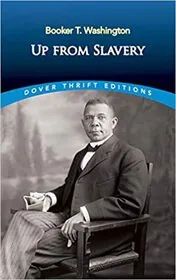Up from Slavery Summary
Author: Booker T. Washington
This page offers our Up from Slavery summary (Booker T. Washington's book). It opens with an overview of the book, and follows with a concise chapter-by-chapter summary.
Drafted with AI assistance and reviewed by a human editor.
As an Amazon Associate, we earn from qualifying purchases (at no extra cost to you).
This book has 1 recommender!
Overview
The narrative commences with the protagonist's birth on a plantation in Franklin County, Virginia and unfolds his life journey through the lens of his racial uplift theory, using his story as an exemplar. After the end of slavery and the Civil War, he and his family moved to Malden, Virginia, where they faced hardships in their early years of freedom. However, the protagonist, driven by curiosity and ambition, overcomes these challenges by dedicating himself to education. His initial taste of learning comes from working at a salt-furnace, and soon his mother gives him a spelling book, leading him to master the alphabet. His education furthers when a literate man from Ohio offers his services as a teacher to the local Black community.
He seizes the opportunity to continue his studies at a school in a nearby town offering both daytime and nighttime classes. While working at the salt-furnace, he learns about a school for Black students, the Hampton Institute, and dedicates himself to save money for the journey to Hampton, Virginia. He leaves the salt-furnace job to serve as a domestic worker for the owner's wife, Mrs. Ruffner, who inculcates in him the values of order, promptness, and cleanliness. Eventually, he makes his journey to Hampton, but faced bigotry and racial discrimination on his way. Despite these challenges, he persists, finding work in Richmond, Virginia and sleeping under a sidewalk until he could afford the rest of his journey to Hampton. Although his appearance and attire initially hinder his entry into Hampton, his meticulousness impresses the head teacher, who not only lets him in but also offers him a janitorial position to cover some of his expenses.
Hampton becomes a turning point in his life, teaching him the dignity of labor and the virtue of selflessness, which later form the core of his social program for racial uplift. He is deeply influenced by the school's founder, General Samuel C. Armstrong, who admires his leadership and selflessness. After graduating from Hampton, he returns to Malden and establishes a school, focusing not only on academics but also personal grooming and industry. His success at Hampton earns him an invitation to head a new school in Alabama, where he undertakes the challenge of teaching in a shanty church before procuring an old plantation to transform into a school. He instills the values of labor and self-reliance in his students by involving them in repairing the buildings and growing crops to sustain the school. His multiple visits to the North to fundraise for the school spotlight him as a public speaker and a Black leader. His speech at the Atlanta Cotton States and International Exposition, known as the "Atlanta compromise," suggests that Black Americans should work hard and educate themselves without directly confronting segregation and the loss of voting rights. The narrative concludes with his optimistic reflection on the legacy of his school and his hopes for racial advancement.
Edited by
Software engineer whose passion for tracking book recommendations from podcasts inspired the creation of MRB.
Lead investor at 3one4 Capital whose startup expertise and love for books helped shaped MRB and its growth.







Comments
Did we miss something? Have feedback?
Help us improve this page by sharing your thoughts